- Home
- William Gibson
Virtual light b-1 Page 2
Virtual light b-1 Read online
Page 2
'What you do for 'em?'
'I'm a lawyer,' she said. Rydell couldn't recall ever actually having met one before, but after that he wound up meeting lots more.
Gunhead's displays were featureless slabs of liquid crystal; they woke when Rydell inserted the key, typed the security code, and ran a basic systems check. The cameras under the rear bumper were his favorites; they made parking really easy; you could see exactly where you were backing up. The downlink from the Death Star wouldn't work while he was still in the car wash, too much steel in the building, but it was Sublett's job to keep track of all that with an ear-bead.
There was a notice posted in the staff room at IntenSecure, telling you it was company policy not to call it that, the Death Star, but everybody did anyway. The LAPD called it that themselves. Officially it was the Southern California (icosynclinical Law Enforcement Satellite.
Watching the dashboard screens, Rydell backed carefully out of the building. Gunhead's twin ceramic engines were new enough to still be relatively quiet; Rydell could hear the tires squish over the wet concrete floor.
Sublett was waiting outside, his silver eyes reflecting the red of passing taillights. Behind him, the sun was setting, the sky's colors bespeaking more than the usual cocktail of additives. He stepped back as Rydell reversed past him, anxious to avoid the least droplet of spray from the tires. Rydell was anxious too; he didn't want to have to haul the Texan to Cedars again if his allergies kicked up.
Rydell waited as Sublett pulled on a pair of disposable surgical gloves.
'Howdy,' Sublett said, climbing into his seat. He closed his door and began to remove the gloves, gingerly peeling them into a Ziploc Baggie.
'Don't get any on you,' Rydell said, watching the care with which Sublett treated the gloves.
'Go ahead, laugh,' Sublett said mildly. He took out a pack of hypo-allergenic gum and popped a piece from its bubble. 'How's ol' Gunhead?'
Rydell scanned the displays, satisfied. 'Not too shabby.'
'Hope we don't have to respond to any damn' stealth houses tonight,' Sublett said, chewing.
Stealth houses, so-called, were on Sublett's personal list of bad calls. He said the air in them was toxic. Rydell didn't think it made any sense, but he was tired of arguing about it. Stealth houses were bigger than most regular houses, cost more, and Rydell figured the owners would pay plenty to keep the air clean. Sublett maintained that anybody who built a stealth house was paranoid to begin with, would always keep the place locked up too tight, no air circulation, and you'd get that had toxic buildup.
If there'd been any stealth houses in Knoxville, Rydell hadn't known about them. He thought it was an L.A. thing.
Sublett, who'd worked for IntenSecure for almost two years, mostly on day patrol in Venice, had been the first person to even mention them to Rydell. When Rydell finally got to answer a call to one, he couldn't believe the place; it just went down and down, dug in beneath something that looked almost, but not quite, like a bombed-out drycleaning plant. And it was all peeled logs inside, white plaster, Turkish carpets, big paintings, slate floors, furniture like he'd never seen before. But it was some kind of tricky call; domestic violence, Rydell figured. Like the husband hit the wife, the wife hit the button, now they were making out it was all just a glitch. But it couldn't really be a glitch, because someone had had to hit the button, and there hadn't been any response to the password call that came back to them three-point-eight seconds later. She must've messed with the phones, Rydell thought, then hit the button. He'd been been riding with 'Big George' Kechakmadze that night, and the Georgian (Tbilisi, not Atlanta) hadn't liked it either. 'You see these people, they're subscribers, man; nobody bleeding, you get your ass out, okay?' Big George had said, after. But Rydell kept remembering a tension around the woman's eyes, how she held the collar of the big white robe folded against her throat. Her husband in a matching robe but with thick hairy legs and expensive glasses. There'd been something wrong there but he'd never know what. Not any more than he'd ever understand how their lives really worked, lives that looked like what you saw on tv but weren't.
L.A. was full of mysteries, when you looked at it that way. No bottom to it.
He'd come to like driving through it, though. Not when he had to get anywhere in particular, but just cruising with Gunhead was okay. Now he was turning onto La Cienega and the little green cursor on the clash was doing the same.
'Forbidden Zone,' Suhlett said. 'Herve Villechaize, Susan I yrell, Marie-Pascal Elfman, Viva.'
'Viva?' Rydell asked. 'Viva what?' 'Viva. Actress.'
'When'd they make that?'
'1980.'
'I wasn't born yet.'
'Time on tv's all the same time, Rydell.'
'Man, I thought you were trying to get over your upbringing and all.' Rydell de-mirrored the door-window to better watch a redheaded girl pass him in a pink Daihatsu Sneaker with the top off. 'Anyway, I never saw that one.' It was just that hour of evening when women in cars looked about as good, in Los Angeles, as anything ever did. The surgeon general was trying to outlaw convertibles; said they contributed to the skin-cancer rate.
'End game. Al Cliver, Moira Chen, George Eastman, Gordon Mitchell. 1985.'
'Well, I was two,' Rydell said, 'but I didn't see that one either.'
Sublett fell silent. Rydell felt sorry for him; the Texan really didn't know any other way to start a conversation, and his folks back home in the trailer-camp would've seen all those films and more.
'Well,' Rydell said, trying to pick up his end, 'I was watching this one old movie last night-'
Sublett perked up. 'Which one?'
'Dunno,' Rydell said. 'This guy's in L.A. and he's just met this girl. Then he picks up a pay phone, 'cause it's ringing. Late at night. It's some guy in a missile silo somewhere who knows they've just launched theirs at the Russians. He's trying to phone his dad, or his brother, or something. Says the world's gonna end in short order. Then the guy who answered the phone hears these soldiers come in and shoot the guy. The guy on the phone, I mean.'
Suhlett closed his eyes, scanning his inner trivia-banks. 'Yeah? How's it end?'
'Dunno,' Rydell said. 'I went to sleep.'
Sublett opened his eyes. 'Who was in it?'
'Got me.'
Sublett's blank silver eyes widened in disbelief. 'Jesus, Berry, you shouldn't oughta watch tv, not unless you're gonna pay it attention.'
He wasn't in the hospital very long, after he shot Kenneth Turvey; barely two days. His lawyer, Aaron Pursley himself, made the case that they should've kept him in there longer, the better to assess the extent of his post-traumatic shock. But Rydell hated hospitals and anyway he didn't feel too bad; he just couldn't recall exactly what had happened. And he had Karen Mendelsohn to help him out with things, and his new agent, Wellington Ma, to deal with the other people from Cops in Trouble, not one of them as nice as Karen, who had long brown hair. Wellington Ma was Chinese, lived in Los Angeles, and Karen said his father had been in the Big Circle gang-though she advised Rydell not to bring it up.
Wellington Ma's business card was a rectangular slice of pink synthetic quartz, laser-engraved with his name, 'The Ma-Mariano Agency,' an address on Beverly Boulevard, and all kinds of numbers and e-mail addresses. It arrived by GlobEx in its own little gray suede envelope while Rydell was still in the hospital.
'Looks like you could cut yourself on it,' Rydell said.
'You could, many no doubt have,' said Karen Mendelsohn, 'and if you put it in your wallet and sit down, it shatters.'
'Then what's the point of it?'
'You're supposed to take very good care of it. You won't get another.'
Rydell never actually did meet Wellington Ma, at least not 'til quite a while later, but Karen would bring in a little briefcase with a pair of eyephones on a wire and Rydell could talk with him iii his office in LA. It was the sharpest tele presence rig Rydell had ever used, and it really did look just like he was right there. He could
see out the window to where there was this lopsided pyramid the color of a Noxzema jar. He asked Wellington Ma what that was and Ma said it was the old Design Center, but currently it was a discount mall, and Rydell could go there when he came to L.A., which was going to be soon.
Turvey's girlfriend, Jenni-Rae Cline, was bringing an intricately interlocking set of separate actions against Rydell, the Department, the City of Knoxville, and the company in Singapore that owned her apartment building. About twenty million in total.
Rydell, having become a cop in trouble, was glad to find that Cops in Trouble was right there for him. They'd hired Aaron Pursley, for starters, and of course Rydell knew who he was from the show. He had that gray hair, those blue eyes, that nose you could split kindling with, and wore jeans, Tony Lama boots, and plain white oxford-cloth pima cotton cowboy business shirts with Navajo-silver bob-ties. He was famous and he defended cops like Rydell from people like Turvey's girlfriend and her lawyer.
Jenni-Rae Cline's lawyer maintained that Rydell shouldn't have been in her apartment at all, that he'd endangered her life and her children's by so doing, and that he'd killed Kenneth Turvey in the process, Mr. Turvey being described as a skilled craftsman, a steady worker, a loving father-figure for little Rambo and Kelly, a born-again Christian, a recovering addict to 4-Thiobuscaline, and the family's sole means of support.
'Recovering?' Rydell asked Karen Mendelsohn in his room in the airport Executive Suites. She'd just shown him the fax from Jenni-Rae's lawyer.
'Apparently he'd been to a meeting that very day,' Karen said.
'What did he do there?' Rydell asked, remembering the Last Supper in drying blood.
'According to our witnesses, he openly horned a tablespoon of his substance of choice, took the podium by force, and delivered a thirty-minute rant on President Milibank's pantyhose and the assumed current state of her genitalia. He then exposed himself, masturbated but did not ejaculate, and left the basement of the First Baptist Church.'
'Jesus,' Rydell said. 'And this was at one of those drug meetings, like A.A.?'
'It was,' Karen Mendelsohn said, 'though apparently Turvey's performance has triggered an unfortunate sequence of relapses. We'll send in a team of counselors, of course, to work with those who were at the meeting.'
'That's nice,' Rydell said.
'Look good in court,' she said, 'in the unlikely event we ever get there.'
'He wasn't "recovering",' Rydell said. 'Hadn't even recovered from the last bunch he jammed up his nose.'
'Apparently true,' she said. 'But he was also a member of Adult Survivors of Satanism, and they are starting to take an interest in this case. Therefore, both Mr. Pursley and Mr. Ma feel it best we coast it but soon, Berry. You and me.'
'But what about the court stuff?'
'You're on suspension from the Department, you haven't been charged with anything yet, and your lawyer's name is Aaron-with-two-a's Pursley. You're out of here, Berry.'
'To L.A.?'
'None other.'
Rydell looked at her. He thought about Los Angeles on television. 'Will I like it?'
'At first,' she said. 'At first, it'll probably like you. I know Ido.'
Which was how he wound up going to bed with a lawyer— one who smelled like a million dollars, talked dirty, slid all around, and wore underwear from Milan, which was in Italy.
'The Kill-Fix. Cyrinda Burdette, Gudrun Weaver, Dean Mitchell, Shinobu Sakamaki. 1997.'
'Never saw it,' Rydebb said, sucking the last of his grande decaf cold capp-with-an-extra-shot from the milky ice at the bottom of his plastic thermos cup.
'Mama saw Cyrinda Burdette. In this mall over by Waco. Got her autograph, too. Kept it up on the set with the prayer-hankies and her hologram of the Reverend Wayne Falbon. She had a prayer-hanky for every damn thing. One for the rent, one to keep the AIDS off, the TB…'
'Yeah? How'd she use 'em?'
'Kept 'em on top of the set,' Sublett explained, and finished the inch of quadruple-distilled water left in the skinny translucent bottle. There was only one place along this part of Sunset sold the stuff, but Rydell didn't mind; it was next to a take-out coffee-bar, and they could park in the lot on the corner. Fellow who ran the lot always seemed kind of glad to see them.
'Prayer-hanky won't keep any AIDS off,' Rydell said. 'Get yourself vaccinated, like anybody else. Get your momma vaccinated, too.' Through the de-mirrored window, Rydell could see a street-shrine to J. D. Shapely, up against the concrete wall that was all that was left of the building that had stood there once. You saw a lot of them in West Hollywood. Somebody had sprayed SHAPELY WAS A COCK-SUCKING FAGGOT in bright pink paint, the letters three feet high, and then a big pink heart. Below that, stuck to the wall, were postcards of Shapely and photographs of people who must've died. God only knew how many millions had. On the pavement at the base of the wall were dead flowers, stubs of candles, other stuff. Something about the postcards gave
Rydell the creeps; they made the guy look like a cross between Elvis and some kind of Catholic saint, skinny and with his eyes too big.
He turned to Suhlett. 'Man, you still haven't got your ass vaccinated yet, you got nothin' but stone white-trash ignorance to thank for it.'
Sublett cringed. 'That's worse than a live vaccine, man; that's a whole 'nother disease right there!'
'Sure is,' Rydell said, 'but it doesn't do anything to you. And there's still plenty of the old kind walking around here. They oughta make it compulsory, you ask me.'
Sublett shuddered. 'Reverend Fallon always said-'
'Screw Reverend Fallon,' Rydell said, hitting the ignition. 'Son of a bitch just makes money selling prayer-hankies to people like your momma. You knew that was all bulishit anyway, didn't you, otherwise why'd you come out here?' He put Gunhead into gear and eased over into the Sunset traffic. One thing about driving a Hotspur Hussar, people almost always let you cut in.
Sublett's head seemed to draw down between his high shoulders, giving him the look of a worried, steel-eyed buzzard. 'Ain't all that simple,' he said. 'It's everything I been brought up to be. Can't all be bullshit, can it?'
Rydell, glancing over at him, took pity. 'Naw,' he said, 'I guess it wouldn't have to be, necessarily, all of it, but it's just-'
'What they bring you all up to be, Berry?'
Rydell had to think about it. 'Republican,' he said, finally.
Karen Mendelsohn had seemed like the best of a whole string of things Rydell felt he could get used to just fine. Like flying business-class or having a SoCal MexAmeriBank card from Cops in Trouble.
That first time with her, in the Executive Suites in Knoxville, not having anything with him, he'd tried to show her his certificates of vaccination (required by the Department, else they couldn't get you insured). She'd just laughed and said German nanotech would take care of all of that. Then she showed Rydell this thing through the transparent top of a gadget like a little battery-powered pressure-cooker. Rydell had heard about them, but he hadn't ever seen one; he'd also heard they cost about as much as a small car. He'd read somewhere how they always had to be kept at body temperature.
It looked like it might be moving a little in there. Pale, sort of jellyfish thing. He asked her if it was true they were alive. She told him it wasn't, exactly, but it was almost, and the rest of it was Bucky balls and subcellular automata. And he wouldn't even know it was there, but no way was she going to put it in in front of him.
She'd gone into the bathroom to do that. When she came back out in that underwear, he got to learn where Milan was. And while it was true he wouldn't have known the thing was there, he did know it was there, but pretty soon he forgot about it, almost.
They chartered a tilt-rotor to Memphis the next morning and got on Air Magellan to LAX. Business-class mostly meant better gizmos in the seatback in front of you, and Rydell's immediate favorite was a telepresence set you could tune to servo-mounted mollies on the outside of the plane. Karen hated to use the little VirtuFax she carr
ied around in her purse, so she'd gotten on to her office in L.A. and had them download her morning's mail into her seatback display. She got down to that fast, talking on the phone, sending faxes, and leaving Rydell to ooh and ah at the views from the mollies.
The seats were bigger than when he used to fly down to Florida to see his father, the food was better, and the drinks were free. Rydell had three or four of those, fell asleep, and didn't wake up until somewhere over Arizona.
The air was funny, at LAX, and the light was different. California was a lot more crowded than he'd expected, and louder. There was a man there from Cops in Trouble, holding up a piece of wrinkled white cardboard that said MENDELSOHN in red marker, only the S was backward. Rydell smiled, introduced himself, and shook hands with him. He seemed to like that; said his name was Sergei. When Karen asked him where the fucking car was, he turned bright red and said it would just take him a minute to get it. Karen said no thanks, they'd walk to the lot with him as soon as their bags turned up, no way was she waiting around in a zoo like this. Sergei nodded. He kept trying to fold up the sign and put it into his jacket pocket, but it was too big. Rydell wondered why she'd suddenly gotten bitchy like that. Tired from the trip, maybe. He winked at Sergei, but that just seemed to make the guy more nervous.
After their bags came, Karen's two black leather ones and the softside blue Samsonite Rydell had bought with his new debit-card, he and Sergei carried them out and across a kind of trafficioop. The air outside was about the same, but hotter. This recording kept saying that the white spaces were for loading and unloading only. There were all kinds of cars jockeying around, babies crying, people leaning on piles of luggage, but Sergei knew where they were going-over to this garage across the way.
Sergei's car was long, black, German, and looked like somebody had just cleaned it all over with warm spit and QTips. When Rydell offered to ride shotgun, Sergei got rattled again and hustled him into the back seat with Karen. Which made her laugh, so Rydell felt better.
As they were pulling out of the garage, Rydell spotted two cops over by these big stainless-steel letters that said METRO. They wore air-conditioned helmets with clear plastic visors. They were poking at an old man with their sticks, though it didn't look like they had them turned on. The old man's jeans were out at the knees and he had big patches of tape on both cheekbones, which almost always means cancer. He was SO burned, it was hard to tell if he was white or what. A crowd of people was streaming up the stairs behind the old man and the cops, under the METRO sign, and stepping around them.

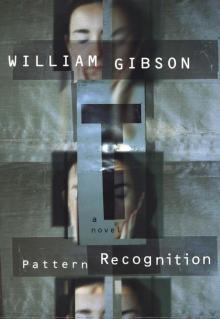 Pattern Recognition
Pattern Recognition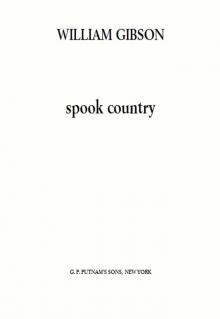 Spook Country
Spook Country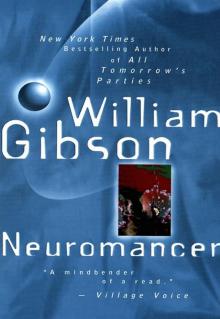 Neuromancer
Neuromancer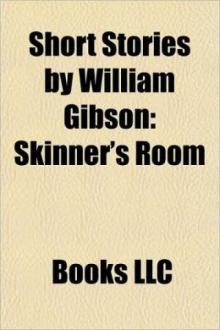 Skinner's Room
Skinner's Room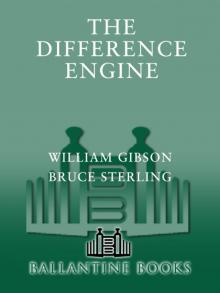 The Difference Engine
The Difference Engine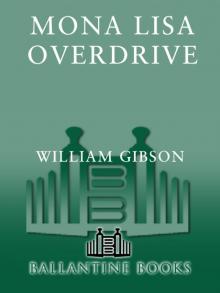 Mona Lisa Overdrive
Mona Lisa Overdrive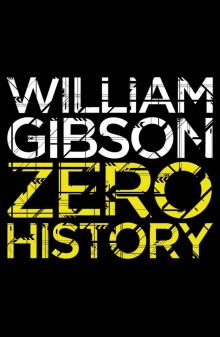 Zero History
Zero History The Peripheral
The Peripheral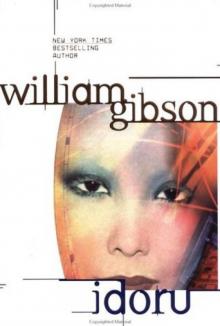 Idoru
Idoru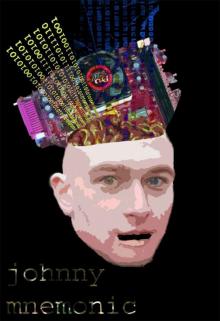 Johnny Mnemonic
Johnny Mnemonic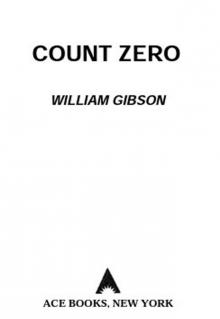 Count Zero
Count Zero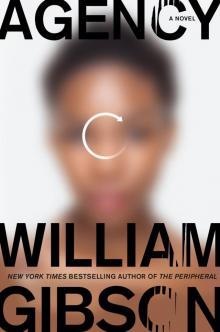 Agency
Agency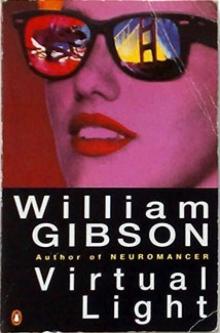 Virtual Light
Virtual Light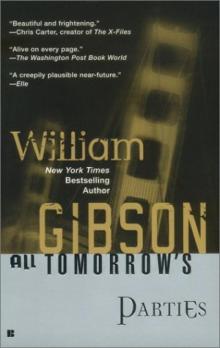 All Tomorrow's Parties
All Tomorrow's Parties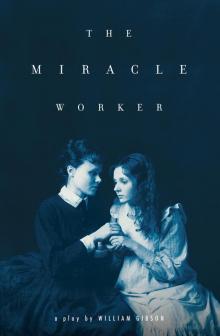 The Miracle Worker
The Miracle Worker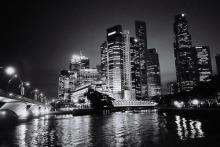 Disneyland with the Death Penalty
Disneyland with the Death Penalty Idoru tb-2
Idoru tb-2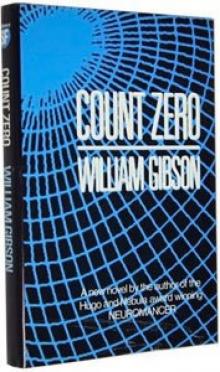 Count Zero s-2
Count Zero s-2 The Gernsback Continuum
The Gernsback Continuum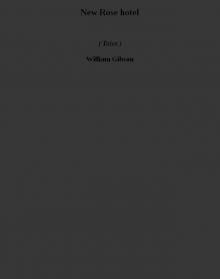 New Rose hotel (tales)
New Rose hotel (tales)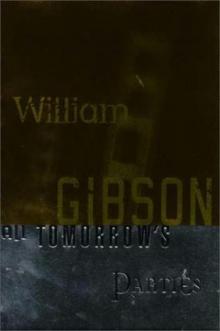 All Tomorrow's Parties bt-3
All Tomorrow's Parties bt-3 Hinterlands
Hinterlands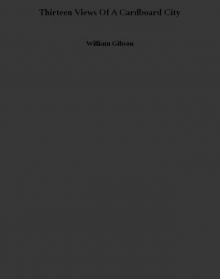 Thirteen Views Of A Cardboard City
Thirteen Views Of A Cardboard City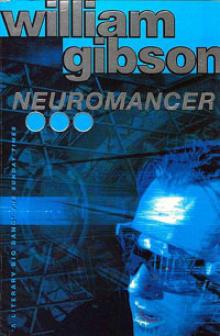 Neuromancer ts-1
Neuromancer ts-1 Virtual light b-1
Virtual light b-1